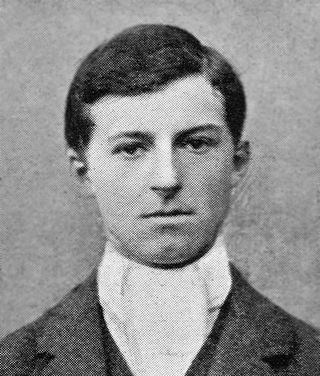
Major Valentine Fleming, was a Scottish Conservative Member of Parliament who was killed in the First World War. He was the father of authors Peter Fleming and Ian Fleming, the latter of whom created the James Bond character.

Francis Walter Stafford McLaren was a British Member of Parliament killed in the First World War in a flying accident.

Neil James Archibald Primrose was a British Liberal politician and soldier. The second son of Prime Minister Lord Rosebery, he represented Wisbech in parliament from 1910 to 1917 and served as Under-Secretary of State for Foreign Affairs in 1915 and as joint-Parliamentary Secretary to the Treasury from 1916 to 1917. He died from wounds received in action in Palestine in 1917.

Oswald Cawley, styled The Honourable from January 1918, was a British soldier and Liberal Party politician.

Captain Harold Thomas Cawley was a British barrister, Liberal Party politician and soldier.

Michael Hugh Hicks Beach, Viscount Quenington was a British politician.

Guy Victor Baring was a British Army officer and politician. He became a Conservative member of the British House of Commons but was one of 22 Members killed in action in the First World War.

Arthur Edward Bruce O'Neill, was an Irish Ulster Unionist Party politician who was the first Member of Parliament to be killed in World War I.

William Glynne Charles Gladstone was a Liberal Party politician in the United Kingdom, and the last of four generations of Gladstones to sit in the House of Commons, the first being his great-grandfather Sir John Gladstone (1764–1851). His body was the last to be officially repatriated to the United Kingdom during the First World War.

Thomas Charles Reginald Agar-Robartes was a British Liberal politician.

Major Francis Bennett-Goldney was an antiquary, Member of Parliament (MP) for Canterbury and former Mayor of Canterbury, who died during World War I.

Duncan Frederick Campbell was a Canadian-born British politician and soldier. He served as a Unionist Member of Parliament for North Ayrshire and died while fighting in World War I.

John Joseph Esmonde was a physician and an Irish nationalist Member of Parliament for North Tipperary from 1910 to 1915.

Major Philip Kirkland Glazebrook, DSO was a British businessman and Conservative politician. He was killed in action in the First World War.

Major Charles Henry Lyell was a British politician and Liberal Member of Parliament who died in the First World War.

The Honourable Charles Thomas Mills was Conservative Member of Parliament for Uxbridge, elected in January 1910 when he was the youngest MP. He was killed, serving as an officer with the Scots Guards on the Western Front.

The Honourable William Lionel Charles Walrond was a British Conservative politician. Did not die from wounds, but from illness while on sick leave in the UK.

Lord Alexander George Boteville Thynne was a British Army officer and Conservative politician.

The Parliamentary War Memorial, also known as the Recording Angel Memorial, is a stone sculpture in Westminster Hall, unveiled in 1922, which commemorates the members of both Houses of Parliament of the United Kingdom who died in the First World War. It names 22 members of the House of Commons, 20 members of the House of Lords, and 9 senior members of staff, together with another 94 sons of members and officers of the House of Commons, who lost their lives in the war. Above the memorial is a large stained glass window which commemorates members and staff of both Houses who died in the Second World War.




















